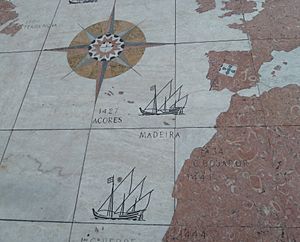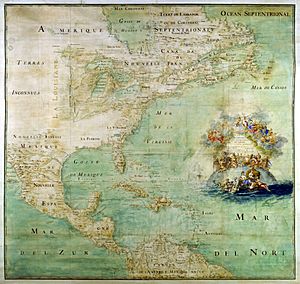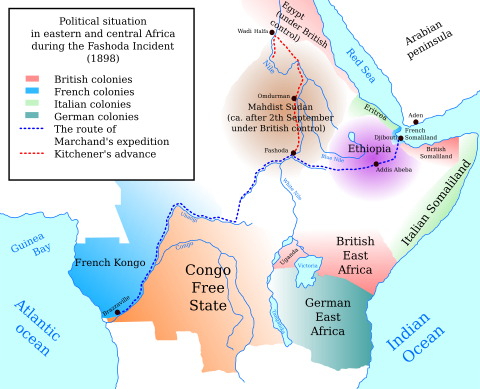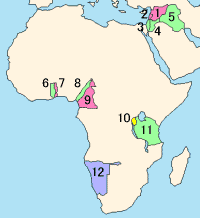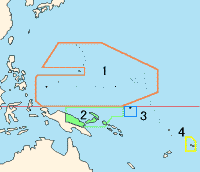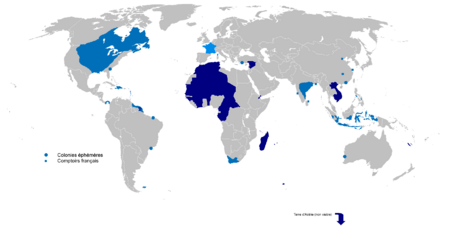Timeline of European imperialism facts for kids
This article is about how European countries expanded their power and influence around the world, starting from the 1400s. This process is called imperialism. It often involved European nations taking control of lands and people outside of Europe, creating large empires.
Contents
Early European Explorers and Colonies (Before 1700)
From the 1400s, European countries like Portugal and Spain began exploring and settling new lands. They built trading posts and established colonies far from Europe.
- 1402: Spain began its control of the Canary Islands.
- 1415: Portugal took control of Ceuta, a city in North Africa.
- 1420-1425: Portuguese people started settling on the island of Madeira.
- 1433-1436: The Azores islands were settled by the Portuguese.
- 1445: Portugal built a trading post on Arguin Island in Africa.
- 1450: Another Portuguese trading post was built on Gorée Island.
- 1462: The Cape Verde islands became a Portuguese settlement.
- 1482: Portugal built Elmina Castle in present-day Ghana, a major trading post.
- 1493: Portuguese people settled on São Tomé and Príncipe islands.
- 1510: Portugal took control of Goa in India.
- 1511: Portugal conquered Malacca City in Southeast Asia.
- 1556: Portugal began to colonize Timor in Southeast Asia.
- 1557: Portugal set up a trading post in Macau, China.
- 1556-1599: Spain conquered the Philippines in Asia.
- 1598: The Dutch started a colony on the island of Mauritius, but they left it in 1710.
- 1608: The Dutch opened their first trading post in India.
- 1613: The Dutch East India Company expanded its business in Java.
- 1623: English traders were executed in Japan, leading England to close its trading base there for over 200 years.
- 1664: The French East India Company was created to trade in Asia and Africa.
European Countries Settle North America
European nations also focused on settling North America, creating many colonies.
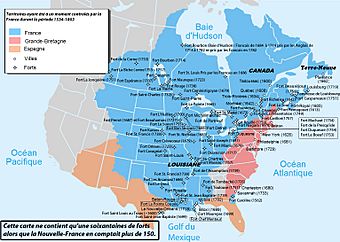
- 1565: Spain founded St. Augustine, Florida.
- 1604: France established Acadia in Canada.
- 1607: The English founded Jamestown, Virginia, their first lasting settlement.
- 1608: France founded Quebec, Canada.
- 1610: Spain founded Santa Fe, New Mexico.
- 1612: The English settled Bermuda.
- 1615: The Dutch founded Fort Nassau, which later became Albany, New York.
- 1620: The English Pilgrims founded Plymouth Colony in Massachusetts.
- 1621: Scotland began its efforts to settle Nova Scotia.
- 1625: The Dutch founded New Amsterdam, which later became New York City.
- 1630: The English founded the Massachusetts Bay Colony, a major Puritan settlement.
- 1634: The English founded the Maryland Colony.
- 1636: The English founded Providence Plantations, which became Rhode Island.
- 1638: Sweden founded Fort Christina in what is now Delaware.
- 1670: The English founded Charleston, South Carolina.
- 1682: English Quakers founded Pennsylvania.
- 1699: France established Louisiana (New France).
Major Changes and Conflicts (1700 to 1799)
This period saw big wars and changes in how European powers controlled their empires.
- 1704: Britain captured Gibraltar, an important naval base.
- 1713: The Treaty of Utrecht ended a major war, giving Britain more land, including parts of Canada.
- 1756–1763: The Seven Years' War was a global conflict. Britain won, taking control of all of Canada from France.
- 1775–1783: The American Revolutionary War saw the Thirteen Colonies fight for independence from Britain. It was the first successful colonial revolt against a European power.
- 1783: The Treaty of Paris ended the war. Britain recognized the United States as an independent country.
- 1784: Britain passed Pitt's India Act to better manage its rule in India and reduce corruption.
Expanding Empires and Independence Movements (1793 to 1870)
This era was marked by European empires growing even larger, but also by many colonies fighting for their freedom.
- 1793–1815: The French Revolution and Napoleonic wars spread new ideas across Europe, like ending serfdom and promoting nationalism.
- 1804–1865: Russia expanded its territory across Siberia to the Pacific Ocean.
- 1807: Britain made the international slave trade illegal. The United States did the same.
- 1810–1820s: Many Spanish colonies in America fought for and gained their independence.
- 1814–15: The Congress of Vienna redrew the map of Europe after the Napoleonic Wars.
- 1819: Stamford Raffles founded Singapore as an important British trading post.
- 1821–1832: Greece won its Greek War of Independence against the Ottoman Empire.
- 1822: Brazil declared its independence from Portugal.
- 1823: The United States issued the Monroe Doctrine, warning European powers not to interfere with newly independent countries in Latin America.
- 1830: France began its conquest of Algeria in North Africa.
- 1833: The Slavery Abolition Act 1833 freed slaves throughout the British Empire.
- 1839–42: Britain fought the First Opium War against China.
- 1842: China was forced to sign the Treaty of Nanking, which opened up trade and gave Britain control of Hong Kong.
- 1846: The Oregon Treaty settled a border dispute between Great Britain and the United States, defining the border at the 49th parallel.
- 1846–48: The Mexican–American War resulted in the United States gaining vast territories from Mexico, including California.
- 1848–49: Britain took control of the Punjab in India after the Second Anglo-Sikh War.
- 1857: The Indian Rebellion against British rule was put down.
- 1858: The British government took direct control of India from the East India Company, appointing a viceroy to rule.
- 1861–1867: France tried to control Mexico, but the United States demanded they leave after 1865.
- 1862: France occupied three provinces in southern Vietnam.
- 1863: France established a protectorate over Cambodia.
- 1867: The British North America Act, 1867 created the Dominion of Canada, giving it self-government.
The Scramble for Colonies (1870–1914)
This period saw European powers rapidly divide up Africa and parts of Asia, known as the "Scramble for Africa."
- 1874: France gained full control of South Vietnam.
- 1875–1900: Britain, France, Germany, Portugal, and Italy competed to take over parts of Africa.
- 1878: Austria occupied Bosnia-Herzegovina. The Treaty of Berlin recognized the independence of Romania, Serbia, and Montenegro.
- 1884: France made Vietnam a country under its control.
- 1885: King Leopold of Belgium established the Congo Free State under his personal rule.
- 1893: France made Laos a protectorate.
- 1893: The Hawaiian Kingdom was overthrown.
- 1895: French West Africa (AOF) was created.
- 1896–1910: Japan took full control of Korea.
- 1898: The Spanish–American War led to the United States gaining control of the Philippines, Guam, and Puerto Rico. Cuba became a protectorate.
- 1898: The Republic of Hawaii was annexed as a United States territory.
- 1900–1908: King Leopold of Belgium was widely criticized for his harsh treatment of rubber workers in the Congo.
- 1908: Austria officially annexed Bosnia and Herzegovina.
World War I and Its Aftermath (1914–1919)
World War I changed the global balance of power and led to the end of some empires.
- 1917: The Jones Act granted full American citizenship to people in Puerto Rico.
- 1918: The Austrian Empire ended, and new independent countries like Czechoslovakia, Poland, and Yugoslavia were formed.
- 1919: After World War I, the colonies of Germany and the Ottoman Empire were placed under the control of the League of Nations. These lands were then given as "mandates" to countries like Great Britain, France, Japan, and others to govern.
Maps
See also
- Timeline of European exploration
- Chronology of Western colonialism
- British Empire
- French colonial empire
- Timeline of British diplomatic history
- Empire of Japan
- Ottoman Empire
- Timeline of the European colonization of North America
 | Delilah Pierce |
 | Gordon Parks |
 | Augusta Savage |
 | Charles Ethan Porter |


